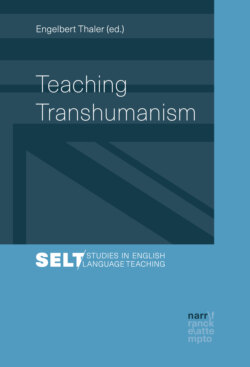Читать книгу Teaching Transhumanism - Группа авторов - Страница 41
На сайте Литреса книга снята с продажи.
5. Outlook: Posthumanism, Post-Covid
ОглавлениеApropos “new dispensation”: It is difficult to speak of post- or transhumanist imaginaries as if Covid-19 did not exist. After all, much of what some years ago would have been discussed as either post- or transhumanist future fantasy has become reality for a global community of learners. This includes biopolitical control and media-enhanced surveillance, on the one hand, and increased vulnerability, pandemic risks of death and disease, but also solidarity and moments of reflection and deceleration, on the other. One can correlate these developments with the posthumanism/transhumanism illustration I have drawn upon in this chapter, and it is likewise possible to understand people’s reactions to the current crisis via the notions of relatability and stubborn subjectivity, respectively. If we accede that posthumanism seeks to decentre the human(ist) notion that we are the measure of all things and that transhumanism underlines that very notion via technological determinism, posthumanist learning after Covid-19 would be more-than-human, yet humane. It would rethink educational practices and the value of solidarity, community and collaboration. Transhumanist learning, by contrast, celebrates the new digital realities, takes remote education for granted and dreams of its economic potentials. And this is where posthumanism comes in just as much as the many experiences of educators all around the world: Transhumanising technology, understood as prosthetic enhancement just as well as tablet-based remote learning, exacerbates social injustice, privileges the privileged while it disenfranchises the disenfranchised, as school lockdowns everywhere have shown. It lacks in social warmth and, yes, relatability, but abets instrumentalising and algorithmic teaching procedures. The main reason why so many teachers have been and still are exhausted and frustrated is not because it is hard or impossible to scan and send around a worksheet. It is knowing that this is only a tiny fraction of educational practice, which overlooks meaningful interaction and communication. No wonder we find new cultural practices in online communication which centre on exactly this kind of interaction. A posthumanist lesson in relatability if ever there was one!
